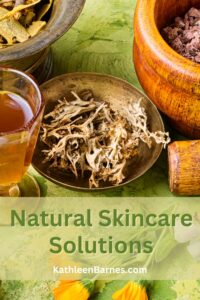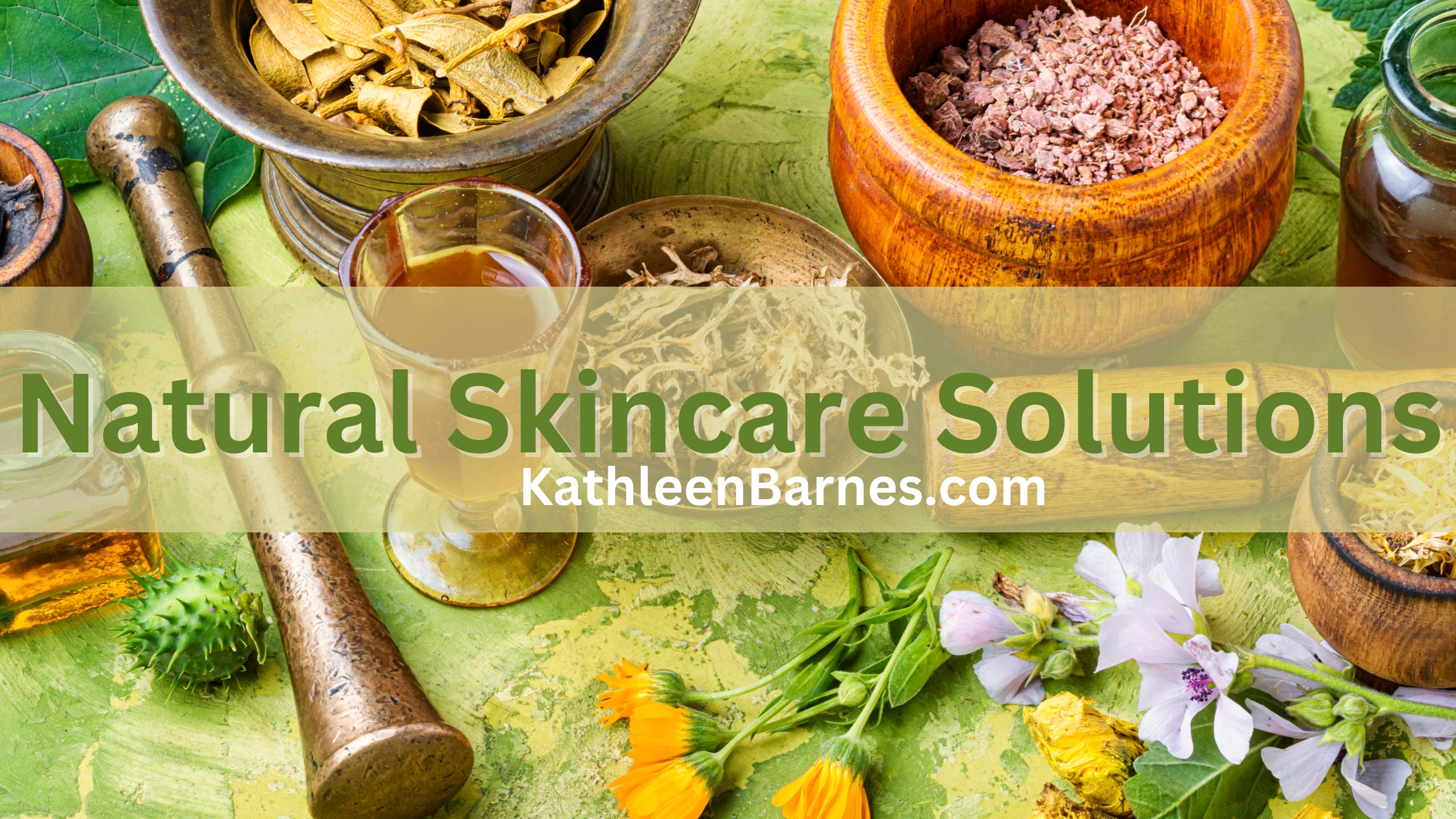 Let’s face it, pun intended, the ingredients in commercial skincare products are garbage. Most of the time, we have no idea what we’re rubbing into our skin.
Let’s face it, pun intended, the ingredients in commercial skincare products are garbage. Most of the time, we have no idea what we’re rubbing into our skin.
I’m at a complete loss as to why ingredients we can’t even pronounce became the norm for not only the products we use, but also the food we eat.
In recent years, I’ve intentionally sought out natural solutions for things like cleaning, and skincare happens to be the next thing on my list.
Case in point: I just picked up my lotion bottle. Something that is supposed to be designed to moisturize automatically contains alcohol, a chemical known for its drying properties. They also managed to slide a bunch of coloring in there like Red 40 and Yellow 5.
WHY!?!
Probably because all those chemicals make it a terrible color, so let’s fix it with carcinogens!
The benefits of natural skincare are manifold. Plant-based ingredients are typically rich in vitamins, minerals, and antioxidants, which can nourish and protect the skin without the harsh chemicals found in many synthetic products.
Moreover, these natural ingredients often come with therapeutic properties that can address various skin concerns such as inflammation, dryness, and acne.
Let’s jump in!
Key Plant Ingredients and Their Benefits
Aloe Vera: Hydration and Soothing Properties
Aloe vera is a well-loved ingredient in natural skincare, known for its incredible hydration and soothing abilities.
The gel extracted from the aloe plant is rich in vitamins, enzymes, and amino acids, making it an excellent moisturizer that can penetrate deep into the skin.
It’s particularly beneficial for soothing sunburns, reducing redness, and healing minor wounds.
Aloe vera also has anti-inflammatory properties, making it a great choice for calming irritated skin and reducing the appearance of acne.
Chamomile: Anti-Inflammatory and Calming Effects
Chamomile, often found in teas and skincare products, is celebrated for its anti-inflammatory and calming properties.
The extracts from chamomile flowers contain powerful antioxidants like flavonoids and sesquiterpenes, which help to soothe the skin and reduce inflammation.
Chamomile is particularly effective for sensitive skin types, providing relief from conditions such as eczema and rosacea.
Its calming effects also make it a popular choice for nighttime skincare routines, helping to relax the skin and mind.
Lavender: Antibacterial and Relaxing Benefits
Lavender is a versatile herb known for its pleasant aroma and therapeutic benefits.
In skincare, lavender oil is prized for its antibacterial and antifungal properties, which can help to combat acne and other skin infections.
Additionally, lavender is known for its calming and relaxing effects, which can reduce stress-related skin issues.
Incorporating lavender into your skincare routine can promote a sense of tranquility while improving skin health and clarity.
Tea Tree Oil: Acne-Fighting and Antiseptic Qualities
Tea tree oil is a potent essential oil renowned for its acne-fighting and antiseptic qualities.
Derived from the leaves of the Melaleuca alternifolia plant, tea tree oil has strong antibacterial and anti-inflammatory properties, making it effective in treating and preventing acne.
It can also be used to soothe insect bites, cuts, and wounds due to its antiseptic nature.
When used in skincare, tea tree oil should be diluted to prevent irritation, but its powerful effects can significantly improve the complexion and overall skin health.
Rosehip Oil: Rich in Vitamins and Great for Anti-Aging
Rosehip oil, extracted from the seeds of rose bushes, is a powerhouse of vitamins and essential fatty acids.
It is rich in vitamins A and C, which are crucial for skin health and regeneration. Vitamin A helps to improve skin texture and reduce the appearance of fine lines and wrinkles, while vitamin C brightens the skin and boosts collagen production.
Rosehip oil is also known for its moisturizing properties, making it an excellent choice for dry and mature skin types.
Its ability to promote cell regeneration and improve skin elasticity makes it a valuable addition to any anti-aging skincare routine.
Green Tea: Antioxidant and Anti-Inflammatory Benefits
Green tea is not just a healthy beverage; it’s also a powerful skincare ingredient.
Rich in antioxidants, particularly epigallocatechin gallate (EGCG), green tea can protect the skin from environmental damage and reduce the signs of aging.
Its anti-inflammatory properties help to calm irritated skin and reduce redness, making it suitable for sensitive and acne-prone skin.
Green tea also helps to control sebum production, which can prevent acne breakouts.
Incorporating green tea into your skincare routine can enhance your skin’s overall health and appearance.
DIY Plant-Based Skincare Recipes
Aloe Vera Gel: How to Extract and Use for Hydration
Aloe vera gel is a simple yet powerful skincare remedy that you can easily make at home. Here’s how to extract and use it:
Extracting Aloe Vera Gel
- Cut a mature aloe vera leaf from the plant.
- Wash the leaf thoroughly and let it sit upright to allow the yellow sap to drain out.
- Slice the leaf open lengthwise and scoop out the clear gel using a spoon.
- Blend the gel until it becomes smooth.
Using Aloe Vera Gel
- Apply the gel directly to clean skin as a hydrating moisturizer.
- Use it as a soothing treatment for sunburns, minor cuts, and irritated skin.
- Store any leftover gel in an airtight container in the refrigerator for up to a week.
Chamomile Toner: Simple Recipe for Calming Irritated Skin
Chamomile toner is perfect for soothing and calming irritated skin. Here’s a quick and easy recipe:
Ingredients
- 1 cup of water
- 1 chamomile tea bag or 1 tablespoon of dried chamomile flowers
- 1 teaspoon of witch hazel (optional)
Instructions
- Boil the water and steep the chamomile tea bag or dried flowers for 10 minutes.
- Allow the tea to cool completely.
- Strain the tea into a clean bottle and add the witch hazel if using.
- Apply the toner to your face with a cotton pad after cleansing, and let it dry naturally.
- Store the toner in the refrigerator for up to one week.
Lavender and Honey Face Mask: Steps to Create a Soothing Mask
This lavender and honey face mask is excellent for calming and nourishing the skin.
Ingredients
- 1 tablespoon of raw honey
- 2-3 drops of lavender essential oil
Instructions
- In a small bowl, mix the honey with the lavender essential oil until well combined.
- Apply the mixture to your clean face, avoiding the eye area.
- Leave the mask on for 15-20 minutes.
- Rinse off with warm water and pat your face dry.
- Use this mask once a week for best results.
Tea Tree Oil Acne Treatment: Dilution and Application Methods
Tea tree oil is a potent remedy for acne, but it should always be diluted before use.
Ingredients
- 1 teaspoon of carrier oil (such as jojoba or coconut oil)
- 1-2 drops of tea tree essential oil
Instructions
- Mix the tea tree oil with the carrier oil.
- Dip a cotton swab into the mixture and apply it directly to acne spots.
- Leave it on overnight and rinse off in the morning.
- Use this treatment nightly until the acne clears up.
Rosehip Oil Serum: Recipe for a Nourishing Night Serum
Rosehip oil is a fantastic ingredient for a nourishing night serum.
Ingredients
- 2 tablespoons of rosehip oil
- 5 drops of vitamin E oil
- 3 drops of lavender essential oil
Instructions
- Combine all the ingredients in a small, dark glass bottle.
- Shake well to mix.
- Apply a few drops of the serum to your clean face and neck before bed, gently massaging it into the skin.
- Store the serum in a cool, dark place.
Green Tea Facial Scrub: Instructions for an Antioxidant-Rich Scrub
This green tea facial scrub provides gentle exfoliation while delivering powerful antioxidants to your skin.
Ingredients
- 1 tablespoon of green tea leaves or 1 green tea bag
- 2 tablespoons of sugar (preferably brown sugar)
- 1 tablespoon of coconut oil
Instructions
- If using green tea leaves, grind them into a fine powder. If using a tea bag, simply cut it open and use the contents.
- In a bowl, mix the green tea with the sugar and coconut oil until well combined.
- Gently massage the scrub onto your damp face in circular motions for 1-2 minutes.
- Rinse off with warm water and pat dry.
- Use this scrub once a week for glowing, smooth skin.
Benefits of Plant-Based Skincare
Gentle on the Skin: Less Risk of Irritation and Allergies
One of the most significant advantages of plant-based skincare is its gentle nature. Natural ingredients like aloe vera, chamomile, and lavender are less likely to cause irritation or allergic reactions compared to synthetic chemicals found in many conventional skincare products.
These plant-based ingredients are often more compatible with our skin’s natural chemistry, making them suitable for even the most sensitive skin types.
Eco-Friendly: Sustainable Sourcing and Biodegradable Ingredients
Plant-based skincare is not only beneficial for your skin but also for the environment. Many natural skincare brands prioritize sustainable sourcing, ensuring that the ingredients are harvested in ways that do not harm the ecosystem.
Additionally, plant-based products are often biodegradable, meaning they break down naturally without polluting the environment.
Nutrient-Rich: Packed with Vitamins, Minerals, and Antioxidants
Plants are nature’s treasure trove of nutrients. Ingredients like rosehip oil, green tea, and chamomile are rich in vitamins, minerals, and antioxidants that nourish and protect the skin.
Vitamins A, C, and E, commonly found in plant-based products, help to repair skin damage, boost collagen production, and provide a youthful glow. Antioxidants from green tea and other botanicals combat free radicals, reducing the signs of aging and promoting overall skin health.
Cost-Effective: Often Cheaper than High-End Synthetic Products
Another compelling benefit of plant-based skincare is its cost-effectiveness. Natural ingredients such as aloe vera, chamomile, and essential oils can be sourced inexpensively, often resulting in products that are more affordable than their high-end synthetic counterparts.
Moreover, many plant-based skincare products can be made at home using simple, readily available ingredients, further reducing costs. By choosing natural skincare solutions, you can achieve healthy, radiant skin without breaking the bank.
How to Incorporate Plant-Based Skincare into Your Routine
Daily Cleanser: Using Gentle Plant-Based Cleansers
Using a gentle plant-based cleanser into your daily skincare routine is a great first step towards healthier skin. Look for cleansers that contain natural ingredients like aloe vera, chamomile, and green tea.
These ingredients cleanse the skin without stripping away its natural oils, leaving your skin feeling fresh and hydrated.
To use, simply apply the cleanser to your damp face, gently massage in circular motions, and rinse with lukewarm water.
Using a plant-based cleanser both morning and night helps to remove impurities, makeup, and excess oil, setting the foundation for the rest of your skincare routine.
Toner: Benefits of Using Plant-Based Toners
A plant-based toner can help to balance your skin’s pH levels, tighten pores, and provide an extra layer of hydration. Ingredients like witch hazel, rose water, and chamomile are excellent choices for a natural toner.
After cleansing, apply the toner to your face using a cotton pad or spritz it directly onto your skin. Let it absorb before moving on to your next skincare step.
Regular use of a plant-based toner can help to soothe irritated skin, reduce inflammation, and prepare your skin to better absorb serums and moisturizers.
Moisturizer: Choosing Plant-Based Oils and Creams
Moisturizing is a crucial step in any skincare routine, and plant-based oils and creams offer deep hydration and nourishment.
Oils like rosehip, jojoba, and argan are packed with vitamins and fatty acids that can help to maintain your skin’s moisture barrier.
For a more traditional cream, look for products that use shea butter, coconut oil, and botanical extracts.
Apply your plant-based moisturizer twice daily, after cleansing and toning, to keep your skin soft, supple, and protected from environmental stressors.
Exfoliation: Natural Exfoliants for Smooth Skin
Exfoliation helps to remove dead skin cells, revealing a brighter and smoother complexion.
Natural exfoliants like sugar, oatmeal, and coffee grounds can be used to create gentle scrubs that won’t harm your skin.
Aim to exfoliate once or twice a week, depending on your skin type.
To make a simple scrub, mix your chosen exfoliant with a bit of coconut oil or honey, and gently massage it onto your damp face.
Rinse thoroughly with warm water. Regular exfoliation with plant-based ingredients helps to prevent clogged pores, smooth rough patches, and promote cell turnover.
Special Treatments: Using Plant-Based Serums and Masks for Specific Concerns
Plant-based serums and masks can target specific skin concerns such as acne, aging, and dryness. Serums with ingredients like tea tree oil, vitamin C, and hyaluronic acid can be applied after toning and before moisturizing to deliver concentrated benefits.
For masks, consider using ingredients like clay, aloe vera, and matcha green tea. These masks can be used weekly to provide an intensive treatment that addresses your skin’s needs.
Apply the serum by patting it into your skin, and leave masks on for 15-20 minutes before rinsing off.
Tips for Choosing the Right Plant-Based Products
Reading Labels: Understanding Ingredient Lists
When choosing plant-based skincare products, it’s essential to understand the ingredient list.
Look for products that list natural ingredients at the top, indicating they are present in higher concentrations.
Avoid products with long lists of chemicals or synthetic additives. Familiarize yourself with common beneficial plant-based ingredients such as aloe vera, chamomile, lavender, and tea tree oil.
Additionally, be cautious of products labeled as “natural” or “organic” without proper certification, as these terms can sometimes be misleading.
Patch Testing: Importance of Testing New Products
Before incorporating any new plant-based product into your skincare routine, it’s important to perform a patch test.
This helps to ensure that you do not have an adverse reaction to the new product.
To patch test, apply a small amount of the product on a small area of your skin, such as the inside of your wrist or behind your ear. Wait 24 to 48 hours to see if any redness, itching, or irritation occurs.
If your skin remains clear, it’s likely safe to use the product on your face.
Sourcing: Finding Reputable Brands and Suppliers
Choosing reputable brands and suppliers is key to ensuring the quality and efficacy of plant-based skincare products.
Look for brands that are transparent about their sourcing practices, use high-quality, sustainably harvested ingredients, and avoid harmful chemicals.
Certifications from organizations such as USDA Organic, Ecocert, and Leaping Bunny can provide additional assurance of a product’s purity and ethical production.
Reading reviews and seeking recommendations from trusted sources can also help you find brands that are committed to providing safe and effective plant-based skincare solutions.
Customization: Tailoring Products to Your Specific Skin Type and Concerns
Everyone’s skin is unique, and what works for one person may not work for another.
Tailoring plant-based products to your specific skin type and concerns is essential for achieving the best results.
For dry skin, look for hydrating ingredients like aloe vera and hyaluronic acid.
If you have oily or acne-prone skin, choose products with tea tree oil or witch hazel for their clarifying properties.
For anti-aging benefits, opt for products containing rosehip oil or vitamin C.
Understanding your skin’s needs allows you to select products that will address your specific concerns, providing a more personalized and effective skincare routine.
Final Thoughts
Incorporating natural ingredients into your skincare routine can be a transformative experience, bringing you closer to the nourishing power of plants and away from harsh chemicals.
Whether you start with a simple aloe vera gel or explore more complex DIY recipes, the journey towards natural skincare is filled with opportunities for discovery and improvement.
Start by integrating one or two plant-based products into your daily routine and observe the positive changes in your skin’s health and appearance.
We’d love to hear about your experiences and any favorite plant-based skincare recipes you’ve tried. Share your stories and tips in the comments below, and let’s inspire each other to embrace the beauty of natural skincare!







